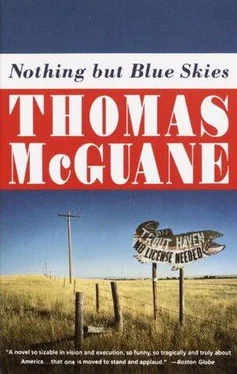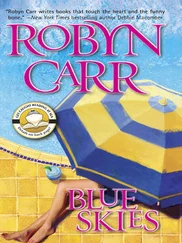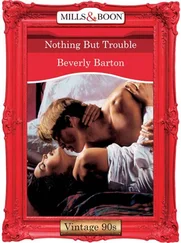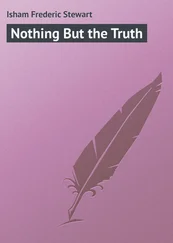He made himself have a productive day, getting the most important mail out and returning the calls of those who were angriest or most offended. He did not talk to the bank. He was not prepared for any more of a bottom-line view than he had acquired from John Coleman. Then he went home and went to bed. He was sick.
He woke up at about eight P.M. and was still sick, but he was hungry. He had wound up the bedclothes in a twisted confusion and he was sweating. The phone rang and it was a wrong number, some old man. He found himself trying to prolong the conversation but it was, he concluded, the result of fever confusing him about how long things took. He thought he was simply not rushing when the old man said, “Look, mister, this is a wrong number. You follow me? I can’t talk to you all night.”
“You’ve got to go,” Frank said. It was attempted wit. He hung up the phone and rolled over. There was still some light coming in through the curtain on the high window. The curtain made it gray and Frank lay looking at the gray light on his hands. He tried to pretend they were someone else’s hands. What sort of person were they the hands of? He couldn’t tell. They were just hands. He was sinking into despair.
Maybe a shower. He let the hot water run straight into his face, trying to get some feeling back. This is like twenty gallons of tears a minute, he reflected as the water surged down off his chin. He tried shampoo, half a handful of golden gel. It swelled his hair into a foaming white crown. He took a piss this way, white-headed, hot water in the face, pissing against the wall. There was this movie scene, she was blowing him in the shower, suds, hot water, some crosscutting between orgasm and the water going down the drain, various arty annoyances. Then the movie went on to something completely different.
When he got back into bed he thought, My mother and father didn’t love me. What would a psychologist say? Probably, Oh, Frank, they loved you; they just didn’t love you in the right way. I don’t buy this about love, Frank would say to the psychologist. You’re worse than an asshole blowhard artist, you psychologist. Love is the right way. If it isn’t “the right way,” it isn’t love.
He was at an abyss of self-pity and he knew it but couldn’t seem to get around it. Sick and alone. If this was a preview, it was altogether frightening. It didn’t help to be so much cleaner. And in a moment, he was back in the bathroom to throw up. Afterward, he brushed his teeth but he couldn’t get the taste of vomit out of his mouth. He tried turning on the television. He was lonely and his accountant had said he was failing. His mother and father didn’t love him. That last fish broke his fly off. Darryl showed that he was a bigger man than Frank was. Lucy would have liked him if he could have just figured out who Lucy was so that he could do something in return. “Travel agent” wasn’t much of a beginning.
He got a thermometer and lay in silence, the covers pulled up under his chin, the glass rod sticking out only an inch from his lips. He had a fever of about 103. That was a pretty good fever. He got up and put on a bathrobe and a sweater over it. He went downstairs and drank a quart of milk with a marmalade sandwich and went back to bed. His hands were sticky. He lay there trying to remember the details about the marmalade. He had read the label. There was something about Seville oranges. It was foreign marmalade, but there was something about the family who made it that he had read and this was now completely gone from his mind. Maybe he was getting Alzheimer’s disease.
On the other hand, he remembered his first joke and there was a connection. He’d heard it from his Brooklyn-born barber when he was a kid. Somebody put an orange in a robin’s nest and when the young birds came back, one said to the other, “Look at the orange Mama laid.” In the barber’s accent, it sounded the same as “orange marmalade.” There was a time when he thought that was a really fine joke.
Many people he had talked to on the phone, before he came home, used the phrase “What are you going to do about …” Frank thought about this locution as though it were a specimen phrase from a foreign language. It seemed to imply that the person addressed was a kind of lever or something. He wished to state that he was no lever; he was a bystander, and on days he felt a little better, a pedestrian. He thought of himself and Holly singing “Hey, you, get offa my cloud,” and he began to weep in silent bitterness. People magazine was always talking about the glitterati. Well, he belonged to the bitterati. This thought caused him to burst out in a laugh, but snot flew from his nose onto the bed covers. He wasn’t about to be overpowered by snot, and so, covering first one nostril, then the other, he recklessly blew snot all over everything, then lay back in thought. This was meant to show he didn’t care about anything. He turned on the radio next to the bed, at low volume, and fell asleep.
When he awoke the next morning, he had the sense that complete chaos was occurring outside his window. Horns were blowing and some piece of roadworking equipment was backing up with its fierce signal going. People were trying to go to work and, with admirable simplicity, were flying off the handle at any delay whatsoever. A new sun shone an all-creating light over the vehicular uproar wedged between two lines of sidewalk. A single construction worker strode between the cars giving the finger to men and women headed for work, to students and to families. “Can you see this?” he asked through windshields and side windows. Magpies flew through the trees. Frank watched the motorists staring straight ahead, not seeing the mad construction worker whose rage showed through every shambling stride he took. At all times, someone was blowing a horn and it was clear that the construction worker would have keenly murdered everyone.
Frank didn’t think he could go out to get any food. He tried to watch the news but it seemed totally out of kilter. There was Gorbachev. He looked like a fucking mouse. A college football player showed the new convertible he got from his dean for improving his forty-yard-sprint time by a full second. Then an enormous weatherman, the beloved Willard, completely out of control. He turned it off and called June. She was already at work. She said he sounded terrible.
“For many perfectly good reasons,” Frank said, “nobody loves me anymore.”
“You’re probably right,” said June.
“June, is it true?”
“No, Jesus! What ails you, Frank?”
“I’m sick. And I’m starving to death. Junie, I can’t quite get it together to take care of myself. I’m running a fever. Everything is so bad, it might be psychosomatic, though I doubt it. Eileen said it was going around.”
“So, you’ve seen Eileen.”
“June, please, I can’t handle much.”
“Okay, I’m coming over. It might take a bit. I’ll stop by the grocery.”
June brought him some sweet rolls and coffee and a carton of orange juice. She spread a towel on the side of the bed and set these things out. Then she pulled up a chair, sat down, crossed her legs and got a paper cup of coffee out of the white paper bag. Frank was propped up in bed and was conscious of the disarray of his room: drawers half pulled out, closet door ajar, one end of the rug rolled up, an overflowing wastebasket. The curtain was still pulled aside from watching the traffic jam.
June blew on her coffee and said nothing. Frank ate. She was wearing a navy blue dress with a string of pearls. She had her hair twisted up into a bun. She had a thin, off-center cheap Oklahoma face that was appealing and self-sufficient. June was his friend. She was a fighter. Unlike most women he knew, she wasn’t astonished to find that life was a fight. So her feistiness lacked the indignation, the bruised quality, that gave relationships between men and women these days their peculiar smelliness. She had once said, quite evenly, “I can look after myself,” when Frank had offered to intervene with a supplier trying to gouge her at the dealership.
Читать дальше












